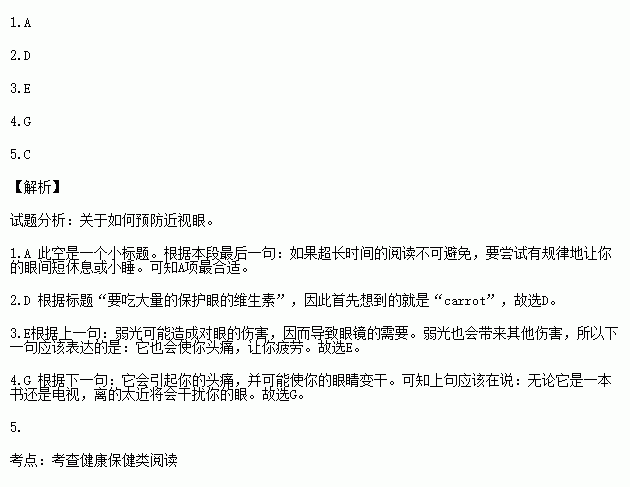题目内容
根据短文内容从短文后的选项中选出能填入空白处的最佳选项,选项中有两项为多余选项。
注意:请将1—4题的答案填涂在机读卡上的位置
How to Prevent Near-sightedness
Myopia, or near-sightedness, can be a severe inconvenience and may even cause big troubles when we operate cars or heavy machinery. Here are some tips that may help you to prevent myopia.
1.1.
Whether it’s for the love of books or because you are studying for a test that just happens to take place tomorrow, don’t overdo it. This means either getting away from a page-turner or starting your studies a few days earlier. If prolonged reading can’t be avoided, try taking regular breaks to rest your eyes or take a nap.
2. Consume lots of eye-protecting vitamins.
2. It’s very meaningful to get kids to eat this healthy orange vegetable, which is rich in vitamins. Still, good doses of multi-vitamins will improve not only your eyesight but your health in general.
3. Do your reading or focusing in well-lit room.
Weak light may cause damage to your eyes and result in the need for glasses. 3.
Buy a reading light or just turn on a bright lamp.
4. Be mindful of the distance between your eyes and the object you’re focusing on.
4. It will also cause your head to ache and may dry out your eyes.
5. 5.
Early detection of near –sightedness can lead to quick treatment and less serious symptoms.
A. Try not to read for long lengths of time.
B. You should also eat a lot of other green vegetables.
C. Talk to an eye care doctor at the first signs of eye trouble.
D. Of course the first choice that comes to mind is the carrot.
E. It will also give you a headache and cause you to become tired.
F. Encourage more outdoor activities, such as running, cycling and playing tennis.
G. Whether it’s a book or the television, being too close is going to bother your eyes.
 每日10分钟口算心算速算天天练系列答案
每日10分钟口算心算速算天天练系列答案假定你是李华,你的美国笔友Tom,来信询问关于你的英语老师的情况。请你按照下列提示用英语写一封回信,介绍你的英语老师。
姓 名 | 王 梅 | 性 别 | 女 |
第一印象 | 热情洋溢,精力充沛 | ||
授课特点 | 清楚条理,严肃耐心 | ||
师生关系 | 严格、热心、友好、融洽 | ||
你的评价 | 良师益友…… | ||
注意:1. 不得简单翻译所给提示;
2. 适当增加细节,以使行文连贯;
3. 词数120左右。开头和结尾已写好,不计入总词数。
Dear Tom,
You’ve asked about my English teacher in your letter, and I’m writing to tell you about her. ____________________________________________________________________________
____________________________________________________________________________
____________________________________________________________________________
Best wishes.
Yours,
Li Hua

